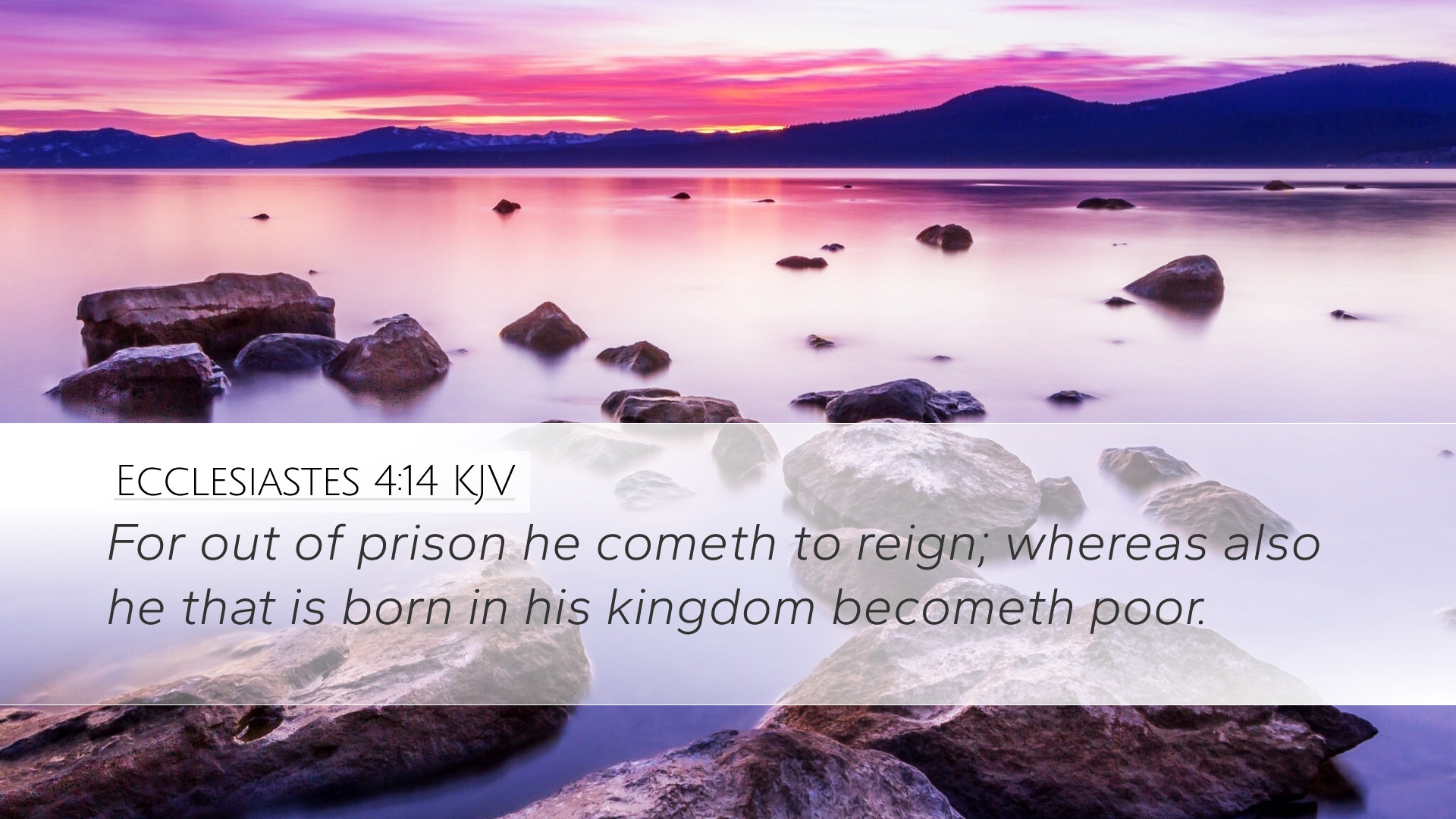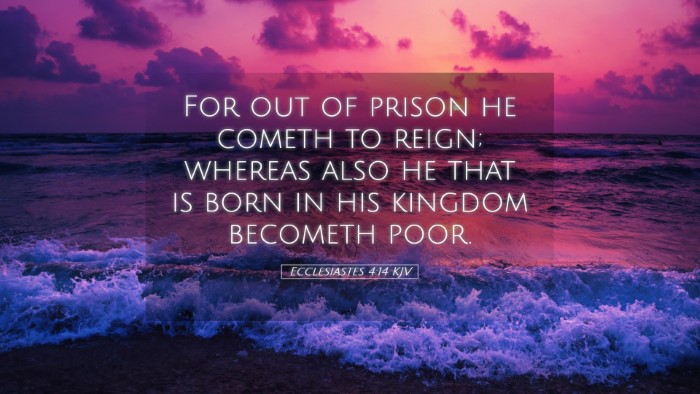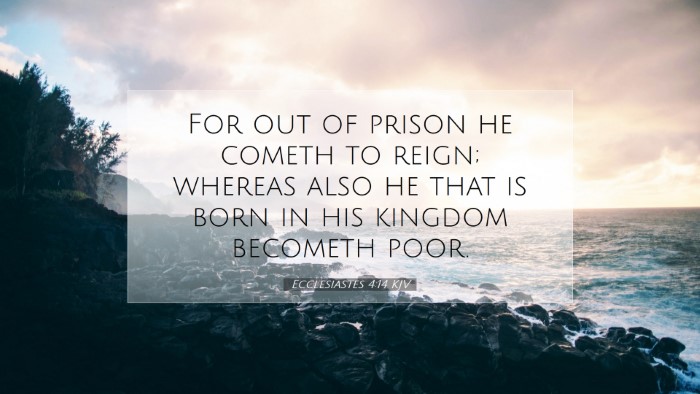Old Testament
Genesis Exodus Leviticus Numbers Deuteronomy Joshua Judges Ruth 1 Samuel 2 Samuel 1 Kings 2 Kings 1 Chronicles 2 Chronicles Ezra Nehemiah Esther Job Psalms Proverbs Ecclesiastes Song of Solomon Isaiah Jeremiah Lamentations Ezekiel Daniel Hosea Joel Amos Obadiah Jonah Micah Nahum Habakkuk Zephaniah Haggai Zechariah MalachiEcclesiastes 4:14
Ecclesiastes 4:14 KJV
For out of prison he cometh to reign; whereas also he that is born in his kingdom becometh poor.
Ecclesiastes 4:14 Bible Commentary
Commentary on Ecclesiastes 4:14
Ecclesiastes 4:14: "For out of prison he cometh to reign; whereas also he that is born in his kingdom becometh poor."
Introduction
This verse from Ecclesiastes addresses the paradoxes of life and the surprising turns fate can take in the human experience. In this commentary, we will delve into the insights from esteemed public domain commentaries, highlighting the key themes and theological implications of this verse.
Contextual Overview
Ecclesiastes is a book that reflects on the meaning of life and the futility of earthly pursuits. The Preacher (Ecclesiastes) observes the world’s injustices, the certainty of death, and the fleeting nature of riches and power. Chapter 4 delves into the themes of companionship, labor, and the existential dilemmas of life, culminating in the assertion of solitude leading to strife, and the elevation of those who rise from humble beginnings.
Historical Context
The verse reflects a historical understanding of social status and its volatility. In ancient Israel, as in many cultures, one's birth status often determined their place in society; yet, here we see a counter-narrative that highlights the unexpected rise of a person from humble circumstances. This realization nudges the reader to contemplate God's sovereignty over human affairs.
Deepening the Meaning
Insights from Matthew Henry
According to Matthew Henry, this verse serves as a stark reminder of the sudden and unpredictable shifts in human fortune. He emphasizes that:
- The “prison” symbolizes not just physical imprisonment but also any form of struggle or lowly state.
- Those who seem disadvantaged can emerge as leaders or heads of great households, pointing to God's intervention and favor in their lives.
Henry suggests that the commentary reveals God's purpose in allowing those of lower status to ascend, ultimately demonstrating that societal definitions of success are fleeting and unreliable.
Insights from Albert Barnes
Albert Barnes elaborates on the implications of the "prison" metaphor, interpreting it as a reflection of the human condition, where the rejection of worldly values could lead one to find true significance. His commentary includes:
- The understanding that in God’s economy, the one who starts in the "prison" may be prepared through trials to reign, indicating spiritual purity and strength forged through adversity.
- A contrast is drawn between those who seem to be born into privilege but end up in poverty due to moral failings or spiritual negligence.
This reading invites further exploration into the workings of divine wisdom, as it often upends human expectations and norms.
Insights from Adam Clarke
Adam Clarke interprets this verse through a lens of redemption and hope, noting that:
- The phrase “out of prison” can be seen as an allegorical transition from sin and despair to a life of purpose and authority.
- His observations extend to the idea that God's plans often transcend human understanding, encouraging believers to trust in divine justice and timing.
Clarke emphasizes that faith and righteousness can lead to remarkable transformations, even when circumstances appear dire.
Theological Implications
As we analyze Ecclesiastes 4:14, it's essential to consider its theological implications:
- The Sovereignty of God: The verse clearly illustrates that despite human attempts to control their destiny, God is the ultimate author of fate, capable of elevating the lowly and humbling the proud.
- Redemptive Narrative: It reflects the core message of redemption found throughout Scripture, that in God’s hands, our positions in life can change dramatically as part of His divine narrative.
- Hope Amidst Injustice: For pastors and theologians, this verse can be a source of hope that teaches congregants about the transformative power of faith, encouraging them to persevere in adversities.
- The Value of Humility: The narrative touches upon the virtue of humility—a reminder that socio-economic status is temporary, and what matters is one's standing with God.
Application for Readers
For contemporary readers, particularly pastors and scholars, this verse encourages a reflective posture:
- In Ministry: Leaders should embrace humility, knowing that God can elevate those who are lowly in spirit or circumstance.
- In Personal Life: Individuals are invited to recognize their struggles as part of a larger divine plan that can lead to eventual triumph.
- In Theological Reflection: It sparks discourse on the nature of God's grace and mercy, challenging believers to see beyond social status and material wealth.
Conclusion
Ecclesiastes 4:14 serves as a profound reflection on the complexities of life, power dynamics, and divine providence. The insights gathered from prominent theologians reveal a rich tapestry of meaning that not only applies in ancient contexts but also resonates with modern struggles faced by individuals and communities today. Through understanding this verse, believers are emboldened to view their circumstances through the lens of faith, recognizing that their value is not dictated by worldly measures but by their relationship with God.


